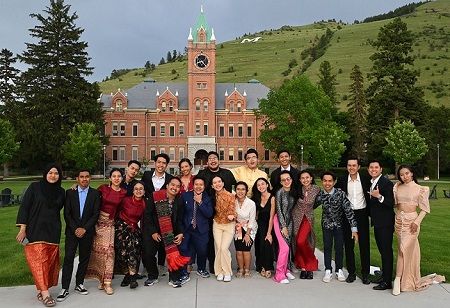The Maureen and Mike Mansfield Center at the University of Montana has recently received a $10 million grant from the U.S. Department of State’s Bureau of Educational and Cultural Affairs to enhance people-to-people connections between the U.S. and Southeast Asia. This funding will support the Young Southeast Asian Leaders Initiative Academic Fellows Program (YSEALI AFP). Subject to future funding, the cooperative agreement may be extended for up to two additional years, potentially bringing the total funding to $30 million over three years.
The YSEALI AFP is a component of the broader Young Southeast Asian Leaders Initiative, the U.S. government’s flagship program aimed at supporting youth in the 11 Southeast Asian countries: Brunei, Cambodia, Indonesia, Laos, Malaysia, Myanmar, the Philippines, Singapore, Thailand, Timor-Leste, and Vietnam. Deena Mansour, executive director of the Mansfield Center, stated that the initiative aims to enhance leadership development across the region, engage young leaders on crucial regional and global issues, and strengthen personal connections between the U.S. and Southeast Asia.
“We are honored to draw on our deep experience in Southeast Asia to support U.S. national security priorities and the U.S. Indo-Pacific Strategy”, Mansour said. “Our demonstrated capacity to administer this huge grant draws from the long Mansfield engagement in Southeast Asia, UM assets in administration and academic excellence, and a track record of successfully implementing State Department exchanges since 2010”.
The Mansfield Center leads all units at the University of Montana in research expenditures. This recent award is the largest ever given by the State Department’s Office of Academic Exchanges to any university nationwide. The fellowship program annually brings around 500 outstanding young leaders to the U.S. for five-week academic institutes hosted at 11 U.S. universities, all overseen by UM. The participating universities include a diverse array of institutions: California State University, Chico; East-West Center; James Madison University; Northern Arizona University; Portland State University; Syracuse University; the University of Connecticut; the University of Kansas; University of Nebraska-Omaha; the University of Nevada, Reno; and Western Washington University.
Institutes focus on one of four themes critical to the relationship between the U.S. and the Association of Southeast Asian Nations: Civic Engagement; Sustainability and Environment; Innovation, Entrepreneurship and Economic Empowerment; and Society and Governance. Programs include an academic residency, leadership development, an educational study tour and community service activities that conclude in Washington, D.C. During the fellowship, participants design projects to be implemented when they return to make change in their home communities.
During their time at UM, participants engage with experts from the Confederated Salish and Kootenai Tribes, Glacier National Park, UM’s Flathead Lake Biological Station, and Butte-Silver Bow County. These study tours offer immersive, place-based learning experiences focused on sustainability, environmental issues, and conservation.
For many Mansfield Center YSEALI AFP participants, the most memorable part of the exchange is engaging with UM and broader community members. Mansour said such connections are critical to deepening intercultural understanding and establishing lasting international friendships. “YSEALI allows us to work with our allies, explain ourselves to other nations and engage with our own citizenry to reinforce the value of our democracy in shaping the direction of the world”, said Peter Baker, Mansfield Center director of international programs.

